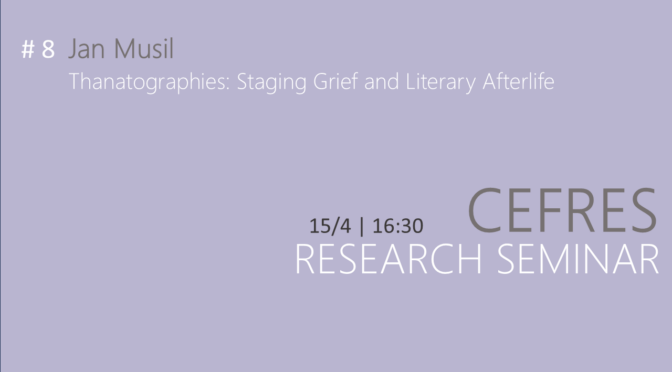8th session of CEFRES in-house seminar
Through the presentation of works in progress, CEFRES’s Seminar aims at raising and discussing issues about methods, approaches or concepts, in a multidisciplinary spirit, allowing everyone to confront her or his own perspectives with the research presented.
Location: CEFRES Library and online (to get the link, write to cefres[@]cefres.cz)
Date: Tuesday, April 15, 2025 at 4:30 pm
Language: English
Jan MUSIL (Faculty of Arts, Charles University / associated at CEFRES)
Chair: Hélène Martinelli (École Normale Supérieure de Lyon)
Abstract
With the christian idea of afterlife gradually fading away, 20th century rediscovered death as a real possibility and ultimate termination of individual life, only to make it into an insufferable, abjected topic and a taboo that is, as Geoffrey Gorer provocatively suggests in 1955, only accessible to the Western culture in hypertrophied genres of literature and film that he calls collectively the pornography of death.
Contrary to this narrative, a body of life/death prose begins to emerge in the second half of the century that does not exploit the topics of illness, dying, death, and specifically grief at the death of a loved one, but rather takes them as a point of departure to understand mortality without resorting to unfounded hope of reunion or exaggeration through genre plots. Thanatographies, being of autobiographical/autofictional character, can be understood, with Paul Ricoeur, as reconfigurations of different tropes related to death and resignifications of the intensified experience of mortality, presenting at the same time a posture (Jérôme Meizoz) of the writer that is concerned with rendering the assumed extraliteral experience in an authentic way (William Watkin). Reframing Freud’s widely used term “work of grief” as “play of grief”, I seek to free the reading of thanatographies of psychological/psychoanalytical assumptions and focus rather on the literary means of performing grief. Selected works by writers such as Peter Handke, Péter Esterházy then show how “modern” loss and death is often approached indirectly and subsequent grief is staged, in accord with the romantic traditions, as authentic using various tropes of inexpressibility, such as metafiction, intertextuality and fragmentation. Finally, drawing on the posthumously published manuscript by Jan Patočka titled “The Phenomenology of Afterlife”, which conspicuously emphasises the role of literature, I suggest we understand thanatographies as one of the ways of reinterpretation and actualization of our relationship to the deceased.
Please find the complete program of 2024–2025 seminar here.

